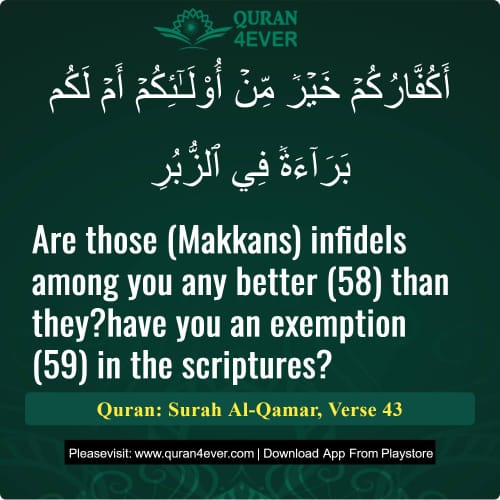
Transliteration:( 'A kuffaarukum khairun min ulaaa'ikum am lakum baraaa'atun fiz Zubur )
"Are those (Makkans) infidels among you any better [58] than they? Have you an exemption [59] in the scriptures?"
This verse poses a question to the people of Makkah, comparing them to the disbelievers of previous nations like Pharaoh’s people. It asks whether they have more power, wealth, or are less guilty in their infidelity.
It should be understood that the word "better" here does not imply any goodness, as infidelity is not good. The verse does not imply that one group is better than another in terms of faith, but rather questions whether the Makkans believe they have any special status.
For example, one cannot say that a Christian is better than a Hindu; instead, it can be said that polytheists are worse than Christians.
The term ‘Bara-atun’ refers to a permit or certificate. The verse challenges the Makkans by asking if they have received any special exemption from Allah in the Heavenly Scriptures, allowing them to utter infidelity without facing punishment.
It is a rhetorical question emphasizing that no such exemption or certificate exists, and they will not be spared for their disbelief.
The tafsir of Surah Qamar verse 43 by Ibn Kathir is unavailable here.
Please refer to Surah Qamar ayat 41 which provides the complete commentary from verse 41 through 46.
(54:43) Are your unbelievers (of Makkah) any better than they?[23] Or have you been granted any immunity in the Scriptures?
23. The address here is directed to the Quraish, as if to say: When the other nation have been punished for adopting disbelief and showing stubbornness and denying the truth, why would you not be punished if you adopted the same attitude and conduct. For, you are not a special people in any way.

For a faster and smoother experience,
install our mobile app now.
Related Ayat(Verses)/Topics